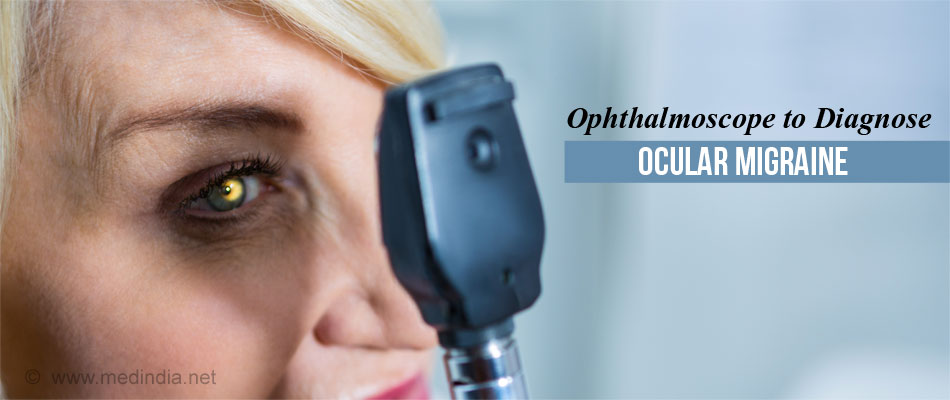- What is an ocular migraine? - (http://www.mayoclinic.org/diseases-conditions/migraine-headache/expert-answers/ocular-migraine/faq-20058113)
- What Is Migraine? - (http://www.aao.org/eye-health/diseases/what-is-migraine)
- Blood Clotting Disorders (Hypercoagulable States) - (http://my.clevelandclinic.org/services/heart/disorders/blood-clotting)
- What are the symptoms of a visual migraine? - (http://www.brighamandwomens.org/departments_and_services/neurology/services/neuroophthamology/visualmigraine.aspx)
- Doyle E, Vote BJ, Casswell AG. Retinal migraine: caught in the act. The British Journal of Ophthalmology. 2004;88(2):301-302. doi:10.1136/bjo.2003.021808.
- Coroi M, Bontas E, Visan R, Defranceschi M, Cioranu CD. Ocular migraine and antiphospholipid antibodies – where we stand? Oftalmologia. 2007;51(3):8-15.
- Winterkorn JMS. “Retinal Migraine†is an oxymoron. J Neuroophthalmol. 2007;27(1):1-2.
- Hill DL, Daroff RB, Ducros A, Newman NJ, Biousse V. Most cases labeled as “retinal migraine†are not migraine. J Neuroophthalmol. 2007;27(1):3-8.
- Gan KD, Mouradian MS, Weis E, Lewis JR. Transient monocular visual loss and retinal migraine. CMAJ : Canadian Medical Association Journal. 2005;173(12):1441-1442. doi:10.1503/cmaj.050128
- Pula JH, Kwan K, Yuen CA, Kattah JC. Update on the evaluation of transient vision loss. Clinical Ophthalmology (Auckland, NZ). 2016;10:297-303. doi:10.2147/OPTH.S94971
- Narita AS, Elder JE. Ocular migraine in an eight-year old girl. Aust N Z J Ophthalmol. 1994;22(4):275-277
- Lewis, Donald W. "Pediatric migraine." Clinician’s Manual on Treatment of Pediatric Migraine. Springer Healthcare Ltd., 2010. 15-26.
What is Retinal / Ocular Migraine?
Ocular migraine refers to recurrent temporary visual changes in one eye and the patient is completely normal between attacks. While some define retinal migraine as associated with headache, others state that it may or may not be associated with headache. Ocular migraine is also referred to as eye migraine, retinal migraine, anterior visual pathway migraine, ophthalmic migraine, or visual migraine.
What are the Causes / Triggers of Retinal / Ocular Migraine?
Ocular migraine appears to be due to vasospasm (spasms in blood vessels) that occur in the retina. The vasospasms cause temporary narrowing of the retinal blood vessels. The vision comes back to normal once the blood vessels relax.
The triggers for these vasospasms include:
- Cold
- Exercise
- Smoking
- Low blood pressure (hypotension)
- High blood pressure (Hypertension)
- Emotional stress
- Birth control pills
- Reduced blood sugar
- Prolonged exposure to heat
- Elevated altitude
- Lack of water (dehydration)
- Bending over
- Inflammation of the arteries
- Restriction in the blood circulation of the retinal arteries
Conditions that should be ruled out in a patient suffering from vision disturbances in one eye include:
- Lupus erythematosus (inflammatory disease)
- High blood pressure
- Increased clotting of blood
- Incomplete closure of the heart valve
- Antiphospholipid syndrome, an autoimmune disorder associated with pregnancy complications
- Giant cell arteritis (inflammatory disease of the blood vessels)
- Epilepsy
- Hardening of arteries
- Sickle cell disease
What are the Symptoms of Retinal / Ocular Migraine?
Symptoms of retinal migraine include the following:
- Temporary vision loss in one eye. The vision loss may appear suddenly or as a gradually increasing shaded area or blind spot. The episodes usually last for up to an hour and the vision is normal between attacks Lights that flash in the eyes (e.g. zigzag lines or jagged lines in the eyes or shimmering stars or spots)
- Headaches following, during, or before the visual loss

- Several similar episodes in the same day
- History of similar earlier episodes and /or a previous history of migraine
How is Retinal / Ocular Migraine Diagnosed?
If the person is going through the symptoms of visual loss while at the doctor’s office, then the ophthalmologist can check for reduced blood flow to the eye with an ophthalmoscope.

The investigative tests that are recommended by an eye specialist to rule out other possible causes of vision changes and diagnose the condition are:
- Tests to evaluate the condition of the heart like electrocardiography, transthoracic echocardiography and Holter monitor
- Tests to evaluate blood flow through blood vessels like carotid duplex Doppler ultrasonography and fluorescein angiography
- Blood tests like total blood count, erythrocyte sedimentation rate, and prothrombin and partial thromboplastin times
How do you Treat Retinal / Ocular Migraine?
Ocular migraine is treated by an ophthalmologist or a neurologist.
Since ocular migraine deals with transient visual loss, the most obvious thing is to have a visual field test performed.
Amyl nitrate inhalation is prescribed in the early stages of an attack to resolve the problem.
Beta blockers (e.g. propranolol), amyl nitrate therapy, and calcium-channel blockers, such as nifedipine and verapamil are prescribed for those who have frequent attacks of transient visual loss (e.g. more than 2 episodes in a week). These drugs relax blood vessels and prevent symptoms of retinal migraine.

Nifedipine or aspirin is used to prevent exercise-related attacks.
If the episodes are not that frequent, then the patient just needs to be reassured and should just go for regular follow-ups with the doctor to monitor the condition.







